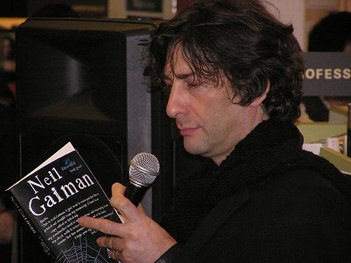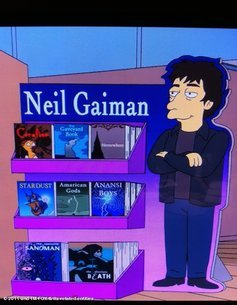The Open Book: Neil Gaiman
Let’s get one thing straight before we start; fuck Dickens.
Just kidding! I’ve got nothing against Charlie. You go Glen Coco!
As a teen, and as a struggling literature graduate, I found writers like Dickens to be immensely stuffy, entertaining and engaging yes but only ever before the twenty minute mark. I used to procrastinate and ignore the reading list for seminars like The Nineteenth Century Novel: an Introduction by reading authors with slightly less ostentatious literary auras and, as we saw in the case of Stephen King, no writer is as unassuming as the genre writer.
Things don’t come less highly acclaimed than comic books (THEY’RE FOR KIDS) and this is exactly where, trawling the dusty, musk scented, cardboard cartons of Dublin’s comic book shops, I found Neil Gaiman. A little dusty yes, somewhat musky absolutely, but none the less glad to have found me, a willing reader. Enter The Sandman.

In the pages of Vertigo’s The Sandman, Gaiman transformed the titular character, previously a 1940s crime fighter, into the personification of all human dreaming, and called him, with a characteristic elegance, Dream. The Sandman series tells the story of Dream as he carries out the daily errands which make up his immortal life. It includes talking ravens, waking nightmares, Lucifer, and Death. The series ran for 75 issues and, following on from the critical and commercial success of Alan Moore and Dave Gibbons’ Watchmen, helped to establish the comic book as a medium for critically valued, adult-orientated fiction.
The Sandman isn’t perfect. Not by any stretch of the imagination. It can be somewhat heavy on the text and isn’t always the most visually dynamic of reads but overall its ten out of ten great reading, comes highly recommended, and you should be reading it right now. Start with the first issue. Twentieth century magicians inadvertently summon and bind the Dream King to the mortal plane, and keeping him locked away for a lifetime, he simply bides his time as they die and he remains; the Prince of Stories is, as stories are themselves, immortal. The summary doesn’t do it justice but in the first issue Gaiman elegantly cements himself as a fine writer, rewriting the history of the original 1940s Sandman, a psychic repercussion of the Dream King’s internment as the unruly realm of the Dreaming tried to make manifest its master through human dreams. It’s a seamless issue and excitingly there follow 74 more. I’ll leave the rest to you.
If you’ve never heard of The Sandman (despite the ubiquity of superheroes, comic books are still actually quite the niche market, you know) maybe you’ve seen Coraline or Stardust on the silver screen? Both were originally penned by Gaiman. Coraline is a scary story for children about a young girl, a magic doorway, and her Other Mother who lovingly wants to sow buttons over her eyes. Stardust is a fairytale about a young man who promises his sweetheart that he will capture and bring her a fallen star which leads to an adventure with unicorns, lions, witches, princes, and a wall.
Well fashioned stories each, hugely successful, and both adapted for the cinema goers of a Wexford summer. Both examples of Gaiman drawing from his apparently near infinite pool of influences which seems to defy borders, dates, or genres, and which has, no doubt, helped him fashion such great stories. Listening to Gaiman talk about what he’s reading, or just books in general, can be, to be entirely honest, a bit of a pain in the ass considering the man’s appetite for fiction knows no bounds and never fails to make me feel like a dullard. I have no doubt in my mind that this predilection for the vehement perusal of fiction has eliminated him as a guest from all the book clubs in his vicinity; [pullquote] “Dammit Marion! Why did you invite Neil?! He’s spent the last thirty five minutes talking about the influence of Lord Dunsany on pre-Tolkien fantasy fiction. There aren’t even any elves in 50 Shades man!!” [/pullquote]
As Sandman, Stardust, and Coraline all exhibit, Gaiman is a fantasy writer, but his huge popularity proves that fantasy need not be a niche genre which excludes a mainstream readership. His work is always open, accessible, and enjoyable. Recently Gaiman sat down with Kazuo Ishiguro (who penned The Remains of the Day and Never Let Me Go) and discussed this very concern, the role of genre in writing and writing in genre. **SPOILER ALERT: it’s a great read.**
Unlike the authors of old, the once rebellious dismantlers of established tropes now defanged and stuffed into the sterile cases of the literary cannon, Gaiman is very much alive, kicking, and fangful. He actively communicates with his readership, having an impressive 2.2 million followers on twitter, and recently he and his wife, singer and performer Amanda Palmer, edited an issue of the New Statesman. He’s spoken and been recorded speaking on countless occasions, the most well-known probably being the commencement speech he gave at the University of Arts Philadelphia. If you’re an artist, if you’re struggling, if you’re a mathematician with twenty minutes to kill, have a listen; you won’t regret it. Make good art.
So what? Neil Gaiman wrote some books: great! He seems like a good guy and he’s fairly handy at giving speeches. [pullquote] In an age where monkeys ride backwards on pigs is this supposed to excite me? Even to hold my attention? Yes. Yes it is. [/pullquote] In an age where books are being electrocuted, and sites like Amazon are slowly squeezing small, independent publishing houses out of existence, Neil Gaiman holds the rare quality of being at once popular, esteemed by the establishment (who give him medals), active, alive, and screaming about the important things like libraries, and genre fiction, and making good art.
This activism for the arts, for writing and reading in particular, is appreciated by all artzers out there, or at least it should be! His communication with his readership is refreshing and helps demystify the man behind the pen, which might be seen as somewhat odd seen as he often revels in mystification, in myth, and in legend in his writing. It is also in parts terrifying: listen Neil, if you’re reading this I’m sorry I described Sandman as “isn’t perfect.” I don’t want to look like a sycophant okay?!

Joyously there’s so very much more to the work of Neil Gaiman and no doubt to the man himself; to try and summarise ‘his project` here would be asinine so I’ll leave it up to other, cleverer people. Or you can just visit Wikipedia…
I’m nearly halfway through American Gods (41.1% my e-reader tells me) and it’s very good (I like Mr. Wednesday’s glass eye!) There’s the kind of sequel, Ansani Boys, for after it, I suppose, although The Ocean at the End of the Lane is supposed to be great and I listened to Gaiman reading from it last month. There’s his run on Black Orchid, which was the first thing he wrote for DC comics. I’ve also to get my hands on that. The Sandman: Overture isn’t even finished so I’ve the last two issues to look forward to! We are not short for choice and for this I am thankful.
A very happy Bloomsday to you all!


I like Gaiman. But you and I are gonna have a Dickens v Gaiman showdown one day, buddy!
yeah yeah. I’d imagine Gaiman is a fan which probably scuppers my argument a bit…
Although if it comes to an arm wrestle, Gaiman will probably win… by virtue of being alive…
Neil Gaiman is, without question, the greatest author ever to live. Of course that’s just my opinion. So what? It’s the one that matters most to me. Anyway, the phrases he uses stick in my brain like my favorite songs and the way he approaches storytelling is completely hypnotic. Neverwhere, The Graveyard Book, Anansi Boys, American Gods, and The Ocean at the End of the Lane are my favorites but I have admittedly not made it through his entire catalog yet.
There’s a whole thread on reddit about this article lads, fair play!
http://www.reddit.com/r/books/comments/3a5lzu/neil_gaiman_holds_the_rare_quality_of_being_at/
Oops, so it’s mostly hatred, oh well, that’s the internet/ trolling for you!
You are forgetting about “Marvel 1602”, which is absolutely, positively pure GOLD! It is the alt-universe to end all alt-universes, and Gaiman makes it what it is. Give it a read, and surely dont forget it next time you write about him 😉
*anansi not ansani